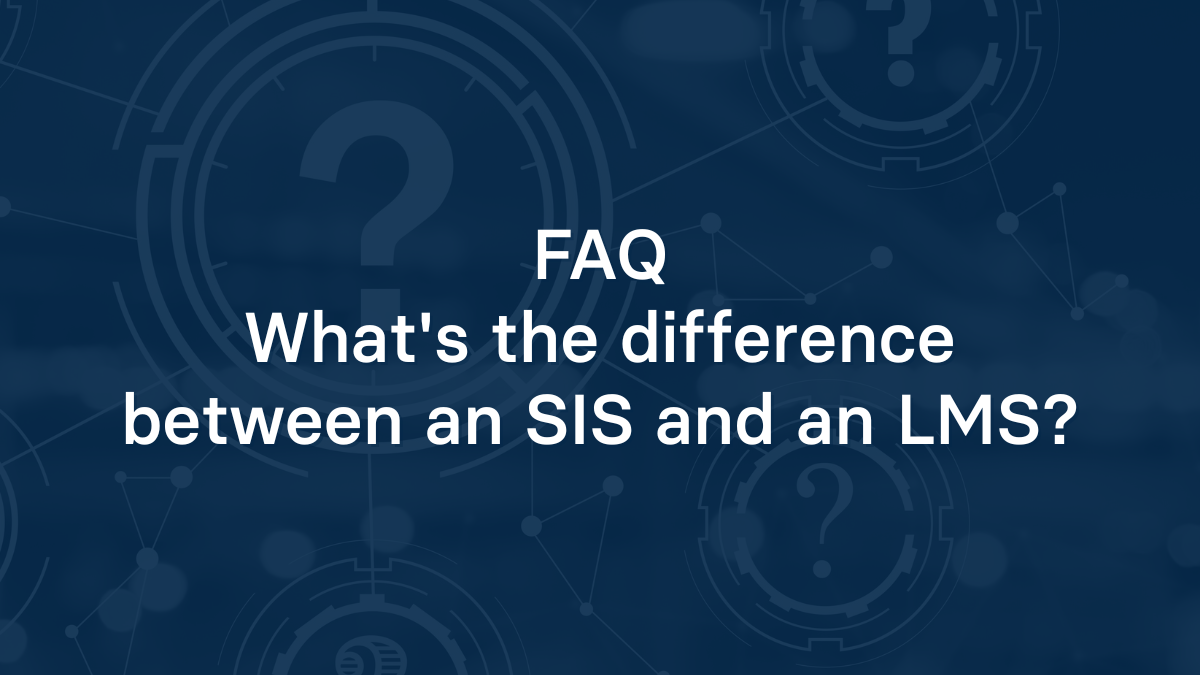Table of Contents
- Intro
- What's the difference between an SIS and an LMS?
- SIS
- LMS
- FAQ
- What are the benefits of an LMS or SIS platform for schools?
- How do I integrate my edtech app with an SIS platform?
- What SIS platforms does Edlink integrate with?
- How does Edlink's SIS integration work?
- Suggested continued reading
There are many differences between an SIS and LMS but let’s start with the similarities. SIS (Student Information Systems) and LMS (Learning Management Systems) serve different purposes in K–12, but they overlap in a few important ways. Both:
- Manage student-related data
Each system works with core information about students, teachers, classes, and enrollments. While the SIS is the system of record, the LMS still relies on accurate rosters and user roles to function. - Organize classes and users
SIS and LMS platforms group students into courses or sections and assign teachers to them. This shared structure is what makes syncing rosters between systems possible. - Support daily school workflows
Teachers use both systems regularly: the SIS for attendance, grades, and records; the LMS for assignments, content, and communication. From a teacher’s perspective, both are part of their everyday toolkit. - Require strong security and permissions
Because they handle student data, both systems use role-based access, authentication, and compliance controls (FERPA, privacy policies, etc.). - Generate data schools rely on
SIS and LMS platforms produce reports that inform decisions whether that’s academic progress, participation, or performance over time. - Integrate with other tools
Neither system exists in isolation. SIS and LMS platforms commonly integrate with edtech apps, assessment tools, and platforms like Google Workspace to keep data consistent.Need to scale across schools and districts
Each system must work reliably for thousands of users, across multiple schools, terms, and schedules.
What’s the difference between an SIS and an LMS?
Below we'll explore the differences between an SIS and an LMS. We'll start with SIS platforms. At the forefront of a school's digital ecosystem are its Student Information System (SIS) and its Learning Management System (LMS).
SIS
An SIS serves as the main record-keeping platform for key actions like:
- student information
- maintaining the data store of a student's official grades,
- attendance records,
- disciplinary actions, and
- other administrative information.
An SIS tends to be geared toward users, such as school admins, who need to collect, visualize, and report large amounts of student data. For example, a superintendent may use the SIS to report district-wide data about student attendance to a state agency in order to receive program funding.
Popular SIS platforms Edlink supports:
LMS
An LMS serves as a platform for delivering:
- digital teaching materials,
- assignments, and
- assessments to students.
An LMS provides an online teaching portal to deliver digital materials between teachers and students. Teachers may use an LMS in a blended learning environment to post videos, presentations, or other digital media to enhance their lessons. An LMS also has assessment features built-in that allow teachers to develop or import quizzes or assignments that students may complete online. The LMS can track the outcomes of the student assessments, including assigned grades and fulfilled state standards.
Popular LMS platforms Edlink supports:
FAQ
What are the benefits of an LMS or SIS platform for schools?
The benefits of an SIS for schools include:
- Centralized student records: All core student information including enrollment, schedules, grades, attendance, and demographics lives in one trusted system.
- Accurate rosters and reporting: Schools can rely on consistent data for daily operations and required district, state, and federal reporting.
- Efficient administration: Scheduling, attendance tracking, report cards, and transcripts are easier to manage at scale.
- Better coordination across staff: Teachers, counselors, and administrators work from the same data, reducing confusion and miscommunication.
- Data security and compliance: SIS platforms include controls that help protect sensitive student data and meet privacy requirements.
The benefits of an LMS for schools include:
- Central place for teaching and learning: Teachers can share materials, assign work, collect submissions, and give feedback in one space.
- Improved student engagement: Students know where to find assignments, due dates, and resources, helping them stay organized and on track.
- Faster feedback: Teachers can grade work and provide comments more efficiently, supporting learning while it’s happening.
- Supports different learning models: LMS platforms work for in-person, hybrid, and remote learning.
- Visibility for families: Many LMS tools allow parents or guardians to view assignments and progress.
How do I integrate my edtech app with an SIS platform?
Instead of building custom integrations for each SIS platform, Edlink offers the ability to integrate with our API and instantly connect with the most popular LMS and SIS platforms used in k12.
What SIS platforms does Edlink integrate with?
View all of our available integrations here.
How does Edlink's SIS integration work?
Edlink is designed to bridge the gap between various educational data systems, offering a unified way for applications to connect with Learning Management Systems (LMS), Student Information Systems (SIS), identity providers (like Clever and ClassLink), and other educational data standards. Explore our supported providers and developer cookbooks in our Docs.
Have more questions about SIS or LMS integration or ready to learn more about how to work with Edlink?
Contact us to schedule a brief discovery call.
Learn More about LMS Integrations
If you’re interested to learn more about LMS Integrations here’re other articles we’ve written:
- Building or Buying Your LMS Integrations
- The Benefits of Integrating Your App with an App
- Updated | State of the LMS Market
- Single Sign-On in Edtech: 6 Reasons Why You Need To Give Schools Multiple Options for SSO
Want to Learn More about Edlink?
If you're looking for a partner who can help guide you through developing LMS integrations (like these), then let’s introduce ourselves. We’re Edlink!

